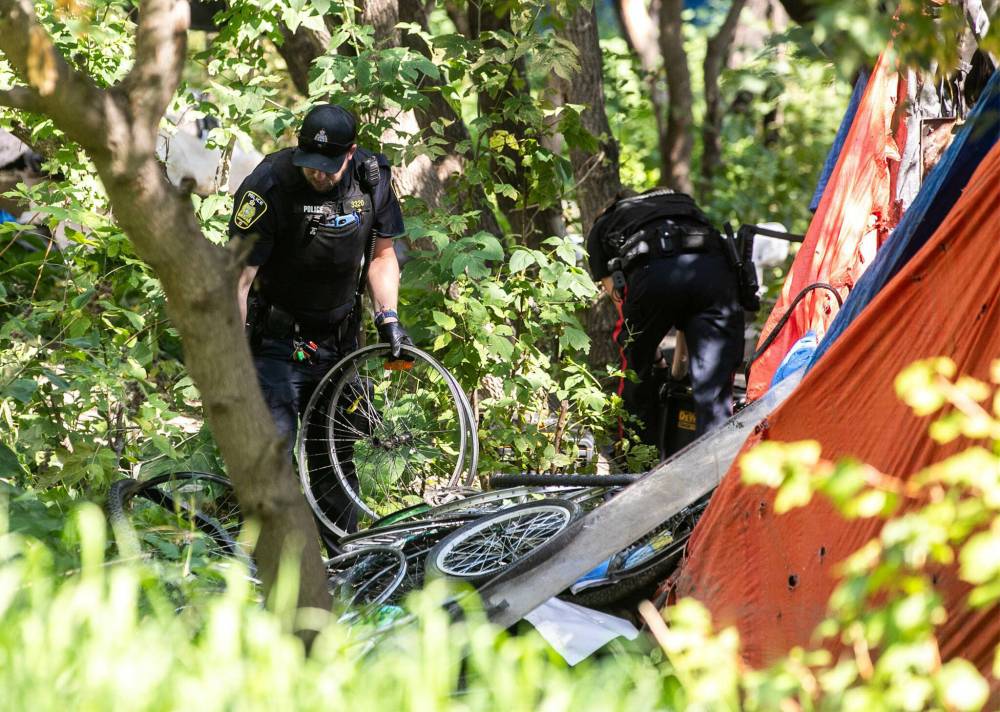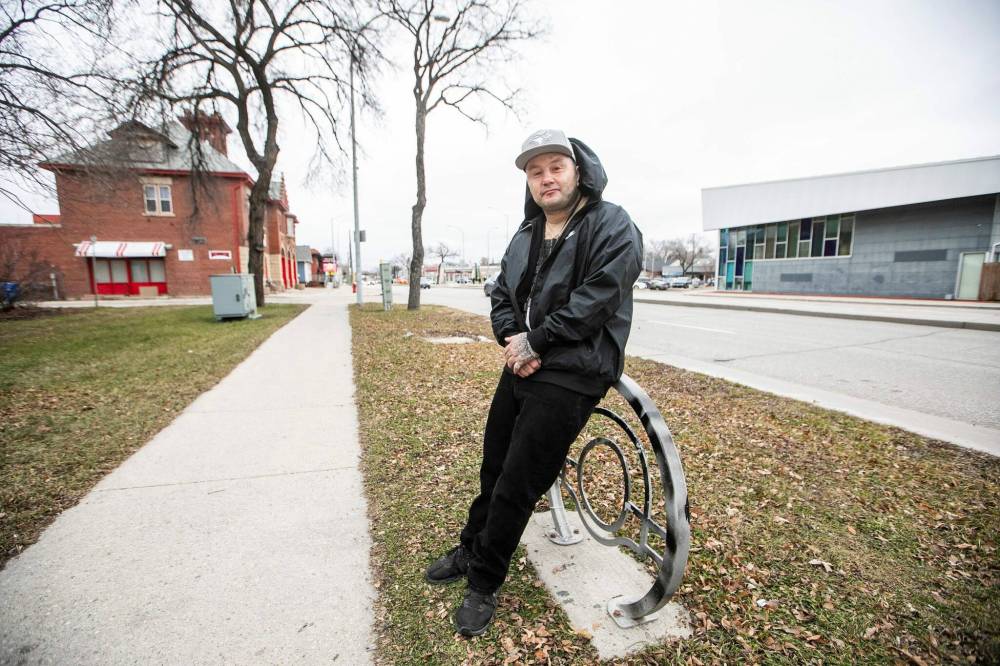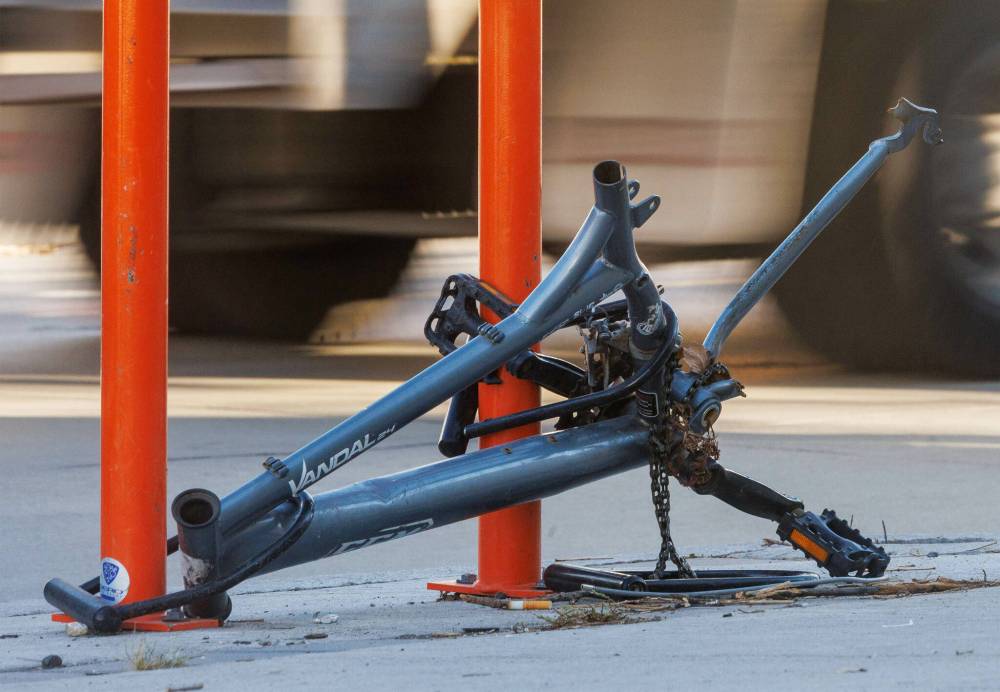Pernicious cycle Is there any strategy that can shift bike-theft crisis out of high gear?
Read this article for free:
or
Already have an account? Log in here »
To continue reading, please subscribe:
Monthly Digital Subscription
$1 per week for 24 weeks*
- Enjoy unlimited reading on winnipegfreepress.com
- Read the E-Edition, our digital replica newspaper
- Access News Break, our award-winning app
- Play interactive puzzles
*Billed as $4.00 plus GST every four weeks. After 24 weeks, price increases to the regular rate of $19.95 plus GST every four weeks. Offer available to new and qualified returning subscribers only. Cancel any time.
Monthly Digital Subscription
$4.99/week*
- Enjoy unlimited reading on winnipegfreepress.com
- Read the E-Edition, our digital replica newspaper
- Access News Break, our award-winning app
- Play interactive puzzles
*Billed as $19.95 plus GST every four weeks. Cancel any time.
To continue reading, please subscribe:
Add Free Press access to your Brandon Sun subscription for only an additional
$1 for the first 4 weeks*
*Your next subscription payment will increase by $1.00 and you will be charged $16.99 plus GST for four weeks. After four weeks, your payment will increase to $23.99 plus GST every four weeks.
Read unlimited articles for free today:
or
Already have an account? Log in here »
There’s perhaps no crime Winnipeggers are more likely to complain about.
The hefty amount it costs Winnipeggers every year is impossible to calculate precisely, since the phenomenon goes as under-reported as it is seemingly omnipresent.
Yet talk to local universities’ sociologists and criminologists, and they’ll tell you the crime — bike theft — isn’t particularly well-studied in Canada.
The public’s picture of this “black market” is filtered mostly through aggravating personal experiences and news reports, which lately in Winnipeg have offered especially eye-catching headlines.
Earlier this month, the Winnipeg Police Service told the public stolen bikes are being stripped down for parts that can be turned into weapons. And not just knives and sharp objects, but improvised shotguns.
“We have concerns not only for the theft of bicycles that are being traded for money… or for drugs, but we’re also concerned about bicycles that are being taken apart and then used to create weapons,” said Insp. Helen Peters, adding a bike tube casing can be the right size to hold a shotgun shell.
In August, city police shut down a bike chop shop at a riverbank homeless encampment in Point Douglas, charging two men with possession of stolen property and seizing dozens of bikes and hundreds of bike parts, as well as a gas generator, pressure washer and other materials. It’s believed to be the first time Winnipeg police secured and executed a search warrant for an encampment.
The WPS also reported that people at the approximately 900-sq.-ft. camp — consisting of tarps on four sides, with multiple “rooms” — were working in shifts, and did not necessarily appear homeless.
MIKAELA MACKENZIE / FREE PRESS Police seized dozens of bikes and hundreds of parts when they executed a search warrant at a homeless camp this summer.
Fabricating shotguns, engaging in shift work, stockpiling stolen goods in hidden dens, being thwarted by warrants — all this may at first give an impression that actors in Winnipeg’s black market for bikes are essentially, to use a loaded term, “organized” criminally.
But talk to local outreach workers and to some of the actors themselves and a different picture emerges, one of a chaotic milieu driven by desperation, poverty and addiction.
“What the police found (in Point Douglas) was more the exception than it is the rule… Generally, it’s very disorganized. It’s part of the flailing behaviour of drug addicts,” says Marion Willis, executive director of the non-profit St. Boniface Street Links, which works with people experiencing homelessness and addiction.
Willis points to the hoarding tendencies of methamphetamine addicts, attributing some bike theft and chopping to the compulsive behaviours the drug can trigger.
In fact, she says she’s lobbied city council for policies differentiating between hoarding disorders and meth addicts’ collecting behaviours so city workers don’t address the two with the same tactics.
“People are attempting to frame (bike theft) as organized crime because there is, I think, at least a limited degree of consciousness around the idea of crimes of poverty,” says Bronwyn Dobchuk-Land, an associate professor in the University of Winnipeg’s department of criminal justice.
Yet, she says, this doesn’t mean bike thieves aren’t “rational” or “organized” in other senses.
“People organize to make the encampment safe for themselves. They steal bikes and organize (in ways) that arise from a shared set of problems in a particular context,” she says. “People are making choices based on a scan of their options… And that goes right down to choice of drugs. People take meth because they have to stay awake when it’s cold outside.”
Point Douglas community activist Sel Burrows suggests there is often criminal co-ordination involved with bike theft, observing that a division of labour — between stealers, choppers and sellers — sometimes exists. But he agrees that it mostly falls well short of “organized crime” in the conventional sense.
“There’s the professional bike thief who goes out looking for high-end bikes and has a battery-powered grinder… (and there’s) the two or three poor souls who definitely need their meth hit or whatever and they will chop up whatever bikes they can and take them down to the junkyard,” he says.
Burrows and Willis, speaking from decades of experience working with underserved urban communities, both say bicycle theft is an important part of the economy fuelling the purchase of meth and fentanyl in Winnipeg, with bikes and bike parts often serving as currency.
Illicit currencies can be laundered, and in an informal sense this appears to be one of the roles chop shops play: a site not just for stripping bikes, but for spray-painting them, scratching off serial numbers, and mixing and matching parts so that when bikes are resold, they can’t be easily identified.
“(Stealing and chopping bikes) is part of the inner-city gig economy. You can’t get a job, you don’t have a car, so you can’t go delivering food and stuff like that… this is something you can do with very little skill,” says Burrows, who has held senior advisory roles with the provincial government.
“It’s all about getting money to buy drugs or having something they can trade for drugs. That’s what it is. That’s the underground economy,” Willis says.
“You can’t get a job, you don’t have a car, so you can’t go delivering food and stuff like that… this is something you can do with very little skill.”
Sellers of stolen bikes are known to offload their wares by a variety of means, such as online via Facebook Marketplace and Kijiji, or by selling them to passers-by on the street.
James Audy, an outreach worker with Street Links, says dealers sometimes accept bicycles from customers, not to re-sell them, but for parts to tune up the look and function of their own bikes. He speaks candidly based not only on his experience with outreach, but as an ex-gang member who ended up homeless for a decade.
“On the streets, the nicer bike you have, then the better the status you have, right?” he says. “If I was dealing drugs and if I seen a nice part, I’d buy it just to put it on my bike.”
MIKAELA MACKENZIE / FREE PRESS Outreach worker James Audy describes the underground market for bikes in Winnipeg as a sort of circular economy where everybody steals off somebody else.
When vehicles are too expensive — and in a car-centric city with a floundering public transit system — Audy says bikes substitute as objects of pride and as means of transportation.
So those drawn to using stolen bikes for lack of an affordable alternative ideally want to get around on something that doesn’t offend the eye and also provides a smooth ride, like virtually everyone else.
“Someone’s always using a bike, it’s the hood… They use bikes — they don’t have money for transportation,” says Marty. He lives in one of downtown Winnipeg’s encampments and runs a makeshift bike shop outside his tent.
He says he resells the bikes he works on usually for around $40 and sometimes services others’ two-wheelers in need of repairs. “You could just as easily throw them out,” he says of the old, loose parts scattered outside his tent. With a hint of humour, he describes his work as a form of recycling.
Lee, who ran a makeshift bike shop in his yard before police intervened this summer, is hurt by the negative perception neighbours had of his family. He says he provides a kind of service for people wanting cheap bicycles and bike parts while making ends meet after an injury left him unable to work.
“I had a couple people stop by — I give them a tire or nut… (later) the cops showed up and tried to say we’re drug dealers… People look at us like we’re bad people. But we’re trying to provide… (and) everyday is a struggle,” he says.
“Everyone’s not perfect: the kids want to be tough. The kids and friends bring parts… and I go through them,” he adds. Lee says his family are not thieves, but if a few stolen parts mix into the piles he has on hand, “I don’t find it that big of a deal.”
“Everybody’s in survival mode… Everybody steals off everybody.”
Marty’s attitude is similar. “People just drop them off, I don’t ask,” he says. “I know some parts are stolen, but… I’m against stealing. I think about if someone was hurt.”
He says he has often been the victim of theft, himself.
“Sometimes people steal from me. It’s my fault, it’s in the open,” he says. “It could be the same people who ask me to fix the bike… People act like children, stealing each other’s toys: they’re mad at something, I can’t put my finger on it.”
Audy isn’t surprised by this and describes the underground market for bikes in downtown Winnipeg as a sort of warped circular economy.
“Everybody’s in survival mode,” he says. “Everybody steals off everybody. It’s a greasy environment. The next generation is seeing all these older guys … stealing and thinking it’s cool, so now they’re trying to step it up a little bit, right?”
Bike theft is not just a “crime of the poor.” Petty thievery can tempt people of all socioeconomic backgrounds and, unsurprisingly, there’s hardly a unified social-scientific explanation for bicycle theft.
Dobchuk-Land says studying bike theft is also complicated by the fact there exists a rift between crime reporting and crime itself. Certain neighbourhoods and demographics are policed more, skewing our perceptions of crime.
However, there is no shortage of studies highlighting how low socioeconomic status — including poverty, unemployment and inequality — correlates in complex ways with certain forms of street crime, like petty theft.
MIKE DEAL / FREE PRESS The theft of bikes and bike parts can be a complex and multi-layered crime that is linked to an underground economy, street survival and drug addiction.
The sociologist is often drawn toward thinking about social systems and structures, and how these might be reformed, when it comes to addressing “crimes of survival” including petty thievery. This could mean not solely improving social opportunities but also reforming how such crimes are policed in the first place, sparking heated debates and a range of policy possibilities.
But for the Winnipegger who enters their garage to find their brand-new city cruiser lifted, often the first and last thought is simply: “What a f—-ing pest!”
If this is close to the average Joe’s conception of the bike thief, one of cinema’s most celebrated films offers a more ambivalent image.
In Vittorio De Sica’s Bicycle Thieves (1948) a struggling family in Italy’s economically desperate first years after the Second World War scrimps and saves for a bicycle needed for the father’s new job posting advertising bills around Rome. That bicycle is lifted from him by a thief on his first day of work, so he too, after much indecision, gives in to the temptation to steal a bike from a stranger, likely just as destitute him. With a guilty conscience, he perpetuates a vicious circle.
The social context is obviously very different: in Winnipeg, the meth and fentanyl addiction crises combine with forces like systemic poverty as factors encompassing bike theft. But the film highlights what academics less poetically term “victim-offender overlap,” a construct studied in fields like urban sociology.
But recognizing the victim status of many thieves doesn’t make bike theft, particularly for poor and working families, any less vexing when it happens to them.
“I mean, I use the example of one young woman who called me in tears. She finally had a job so… she bought her five-year-old a Princess bicycle at Canadian Tire for 100 bucks. And two days later, it was in the shed, and it was stolen,” Burrows says.
“The impact of a low-level property theft will necessarily impact somebody who’s poorer — it’s more of a dent, literally, in their lives and their wealth,” adds Dobchuk-Land.
The City of Winnipeg says about 3,000 bikes are reported stolen every year. It’s impossible to know what the actual number is, but Project 529, North America’s largest bike registry, estimates that only 15-20 per cent of bikes stolen in Canada are reported. If we assume a low average price of $150 per bike, that’s about $2.5 million in damages in Winnipeg, annually.
Last year, as the Free Press reported, only 681 bikes were recovered and just 105 returned to their owners. This includes 64 returned by the city’s bicycle recovery officer, with help from Project 529’s free-to-use bike-registry app called 529 Garage.
In April 2024, the City of Winnipeg began promoting the app to cyclists, and between April and December, residents registered 6,325 bicycles.
“We know that bike chop shops can be linked to the creation of weapons… so obviously, it’s not just a theft concern then, it’s even more so a public-matter.”
In an interview with the Free Press earlier this month, Ins. Peters urged Winnipeggers to register their bikes, or least take photos and record the serial number, and then report them when stolen, otherwise it becomes difficult for police to lay charges.
“We know that bike chop shops can be linked to the creation of weapons — weapons such as zipguns — so obviously, it’s not just a theft concern then, it’s even more so a public-matter.”
She added police have received an increasing number of calls about chop shops in the past year.
Burrows has argued at crime-prevention conferences that bike registration should be mandatory at point of sale, with collaboration from retailers like Walmart and Canadian Tire, placing greater risk on thieves and making it easier for police to investigate and return stolen bikes.
JOHN WOODS / FREE PRESS FILES Point Douglas community activist Sel Burrows believes some working-class families are often reluctant to report stolen bikes and property because they mistrust police or fear reprisal.
He’s not the first to float ideas like these, though they’ve rarely been implemented.
Burrows also believes some working-class families are often reluctant to report stolen bikes and property because they mistrust police or fear reprisal.
He emphasizes the need for a more “eyes on the street” approach, where communities feel empowered to monitor their own neighbourhoods and anonymously report crimes to a trusted liaison who, when need be, calls on law enforcement. (This is much like the approach of Burrows’ tip-line initiative, Point Powerline, which helped earn him induction into the Order of Manitoba in 2017.)
“People feel powerless. They feel that nobody gives a shit about them, and they’re mostly right,” he says.
Because Willis, Burrows and Dobchuk-Land situate bike theft broadly in relation to more systemic issues of inner-city poverty, homelessness and addiction, punitive measures aren’t the first thing they talk about when they discuss bike theft-prevention strategies.
“This whole idea of ‘broken windows’ policing has really effectively made its way into public consciousness,” says Dobchuk-Land. “We’ve got this association between disorder, low-level crime and danger to us that makes us feel violated… when really, assault and interpersonal violence are not correlated with low-level poverty crime.”
“We normalized bike theft, we normalized homelessness, we normalized drug use, we’ve normalized encampment living. We normalized it all.”
In a similar vein, Willis is also troubled by what she sees as an overly punitive approach being taken in dealing with homeless encampments. She’s particularly critical of the city’s new encampment policy, introduced this fall. It prohibits camps in certain areas including near schools, playgrounds, seniors’ facilities, bridges, piers and transit stops, or where “life safety” issues exist.
“I think it is an infringement of basic human rights to take something away without offering them either a shelter or a housing option that is real,” she says.
Willis says we should be realistic and realize creating more social housing for people living in encampments wouldn’t solve all associated issues of theft and addiction.
But she thinks it’s time Winnipeggers reflect more about the bigger picture surrounding nuisances like bike theft, which means more seriously acknowledging and addressing Winnipeg’s addiction and homelessness crises.
“We normalized bike theft, we normalized homelessness, we normalized drug use, we’ve normalized encampment living — we normalized it all,” she says.
conrad.sweatman@freepress.mb.ca

Conrad Sweatman is an arts reporter and feature writer. Before joining the Free Press full-time in 2024, he worked in the U.K. and Canadian cultural sectors, freelanced for outlets including The Walrus, VICE and Prairie Fire. Read more about Conrad.
Our newsroom depends on a growing audience of readers to power our journalism. If you are not a paid reader, please consider becoming a subscriber.
Our newsroom depends on its audience of readers to power our journalism. Thank you for your support.









